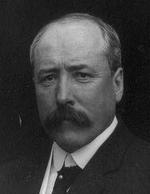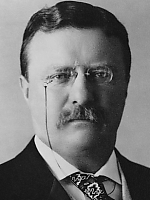 |
[Blog Home Page] |
| Chronicler's Minutiae | |||||||||
|
The Candidates' Election Day - 1904 Posted September 09, 2020 at 06:00pm by Chronicler === Election of 11/8/1904 === The presidential election of 1904 was the first time when a President who had succeeded to the office through the death of his predecessor won his own four-year term. Prognosticators at the time thought that the race would be fairly close and were unprepared for the landslide won by Theodore Roosevelt. His opponent, Alton B. Parker, was one of the most temperamentally suited nominees to run for the office.  Alton B. Parker (Democratic Party) Normally an early riser, Parker slept until 8 am on election day. After breakfast, Parker called the Democratic National Committee on a private line installed for the purpose. Parker and an associate drove to cast their votes in a buckboard, a type of carriage, which was pulled by Parker's famous team of black horses. Since it was a sunny day, they took the Eddyville Road, which winded its way through a pass in the mountains and took more time than the usual route. Along the way, they saw signs reading "Vote for your Neighbor Parker." Parker was actually registered to vote using his daughter's residence and did not vote in Esopus, and some local Republicans considered challenging his vote on this basis. Parker voted in the third district of the Ninth Ward, in a building on Greenkill Avenue formerly used as a pottery. His carriage arrived there at 10:40; Parker handed the reins to his assistant, who was registered in a different precinct and so remained outside. A six-year old boy named Ralph Finnegan ran up to Parker and said "I hope you will be elected." Parker replied "Thank you. You are a good boy. I hope so, too." Parker then greeted people outside the polling place, and when he went in, people standing in line walked back to shake his hand. He obtained his ballot, cast his vote, and as he placed it in the ballot box, a poll worker announced "Alton Brooks Parker votes ballot 147." Parker actually stood there with the ballot partially in the ballot box because two reporters wanted photographs. Then Parker shook hands with the policeman on duty and drove his associate to his polling place. Parker then maintained one of his interesting quirks. He had a standing appointment to see his dentist every year, and he always did that on election day after voting. Following his dental appointment, Parker visited with some friends and then drove through the village of Esopus where he was greeted first by the "elect our neighbor" signs and then by a group of people at the polling place. Parker's extended family came to his house Rosemount, and he played with his grandchildren in the yard before hosting a large supper. The speed of delivering election news had increased noticeably since 1900. The first returns delivered to Parker came from Boston (with mixed results) and Long Island (a shift to Parker over Bryan in 1900). Then, however, the line coming into the house broke. It took an hour to restore service. By that time, it was becoming clear that Roosevelt had been elected. Parker wired his congratulations to President Roosevelt at 8:30 pm, and Roosevelt replied soon thereafter. A group of female neighbors came to call on the Parkers and heard a report that Parker had gained in Texas over Bryan's vote; they cheered for him, and after thanking them he told them that while that news was good he had actually lost the race overall. A group of farmers visited next; they were unaware of the status of the race either. Parker gave each of them a cigar and after a brief visit bid them good night. The day after the election, Parker rose early and rode one of his bay horses into the village of Esopus and convinced the local Democratic leader to raise the American flag (which had been withheld due to the election results). Parker issued a lengthy statement to his Democratic supporters, stating that he would no long seek elective office and and encouraging them to be steadfast to the party. Then he returned home and reviewed his livestock, accompanied by his white dog ironically named Teddy. Parker wrote letters thanking specific Democratic leaders and attended to his estate.  Theodore Roosevelt (Republican) Early on election day, President Roosevelt boarded a train in Washington headed for Oyster Bay. A crows greeted him as he got off the train in Jersey City at 7 am. The President, his party, and his Secret Service detail took a tug named the Lancaster around Manhattan, reaching Long Island City, where they took the Long Island Railroad to the train station in Oyster Bay. A relative met him at the station and drove him to his polling place, which was the 5th precinct of Oyster Bay. He voted in a room on the second story of the Fisher Building on East Main Street. Roosevelt was so excited about voting that he ran up the stairs to the polling place. A reporter took a photograph of him as he handed his ballot to the precinct judge. Voters standing in line wanted to shake his hand as he left. He then took a drive around Oyster Bay and greeted neighbors. Roosevelt returned in Washington the afternoon of election day. His train stopped at Mineola to refresh its water supply, and hundreds of residents took the opportunity to see the President. News of his route of the early morning spread, and people waited to see him on his return at the ferry stop and the train stations. Roosevelt reached the train station in Washington DC at 6:16 pm. The Roosevelts, expecting a close election, had planned a party and invited guests to arrive at 9 pm. The Republican National Committee knew that Roosevelt had won the race by 8pm, which allowed the first family to celebrate privately while awaiting their invited guests. After the second round of celebration, with evidence that Roosevelt was sweeping the Western states, the President went to the press room to see who was there. He asked the small group of reporters to follow him into a smaller office nearby, where he picked up a small scrap of paper. He asked them not to take notes on what he was about to read, as his secretary would provide each of them with a copy. The statement included his appreciation to the American people and a statement that he would not be a candidate for re-election in 1908. Roosevelt spent part of the evening replying to congratulatory telegrams, but so many were arriving that he was limited in his ability to respond. The New York Times reported that the number of telegrams sent to Roosevelt in the 24 hours from the evening of election day to the following evening represented a new record number of telegrams sent to a single person in a day's time. Roosevelt was the first president to received over 300 electoral votes; initial returns credited him with 343 electoral votes, but his actual final tally was 336. He carried every former Free state and the former slave states of Delaware, West Virginia, and Missouri. Third Party Nominees Charles H. Corregan, the nominee of the Socialist Labor Party, was suing the Syracuse Typographical Union No. 55 for dismissing him, which caused him to lose his job. The union took this course because he had used inappropriate language while discussing union business. The court case was scheduled for the week prior to the election. Corregan testified on 11/3 about the result of losing his job. The union hired US Rep. Michael Driscoll as counsel; Driscoll managed to get Corregan to admit that he had turned down a job offer from the Socialist Party newspaper as well as positions in non-union papers. Silas Swallow, the Prohibition presidential nominee, cast his vote slightly past noon at the second precinct of the Second Ward in Harrisburg, Pennsylvania. His quarter of a million votes nationwide represented the second highest vote ever given to a Prohibition presidential nominee (second only to 1892). Eugene V. Debs spent election day at his home in Terre Haute, Indiana. After the results came in, showing that he not only placed third but outpolled Parker in Milwaukee and a handful of other places, Debs predicted a "peaceful revolution in industrial and commercial life." Debs would go on to run three additional presidential campaigns, earning in each case more votes than in 1904. Sources: Syracuse Post-Standard, 11/3-4/1904; Harrisburg Telegraph, 11/8/1904; Indianapolis News, 11/10/1904; Elmira Star-Gazette, 11/8/1904; Brooklyn Citizen, 11/8/1904; New York Times, 11/9-10/1904
|
. | |||||||